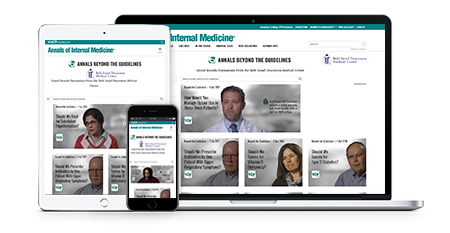Annals Beyond the Guidelines
Cardiovascular disease (CVD) is the leading cause of death in the United States. Hypercholesterolemia is a principal modifiable risk factor for the primary prevention of CVD. In addition to lifestyle modification, statins are an important tool to reduce risk for CVD in selected patients. A useful strategy to identify candidates for statins is to estimate the 10-year risk for CVD through the use of a validated risk calculator. Commonly used calculators include the Framingham risk score and the pooled cohort equation. Multiple randomized controlled trials have shown that statins reduce the risk for CVD in patients without known CVD. Two recent guidelines have proposed an approach to the use of statins in primary prevention of CVD. The American College of Cardiology/American Heart Association and the U.S. Department of Veterans Affairs guidelines form the basis for this discussion. The guidelines differ on the use of advanced testing to modify the 10-year CVD risk estimate and on the need for low-density lipoprotein cholesterol targets to establish the efficacy of statins. Advanced testing with coronary artery calcium measurement may be helpful for patients who are potentially eligible for statin therapy but who are uncertain if they wish to take a statin. In this paper, 2 experts, a preventive cardiologist and a general internist, discuss their approach to the use of statins for primary prevention of CVD and how they would apply the guidelines to an individual patient.
CME/MOC:
Up to 5
AMA PRA Category 1 Credits ™ and MOC Points
Expires June 14, 2025
active
Cost:
Free to Members
Format:
Video Recordings
Product:
Annals Beyond the Guidelines
From Annals of Internal Medicine (annals.org), Beyond the Guidelines is an educational feature based on recent guidelines. Each considers a patient (or patients) who "falls between the cracks" of available evidence and for whom the optimal clinical course in unclear. Presented at Beth Israel Deaconess Medical Center (BIDMC) Grand Rounds, each conference reviews the background evidence and experts then discuss the patient(s) and field audience questions. Videos of the interviews and conference, the slide presentation, and a CME/MOC activity accompany each module.



